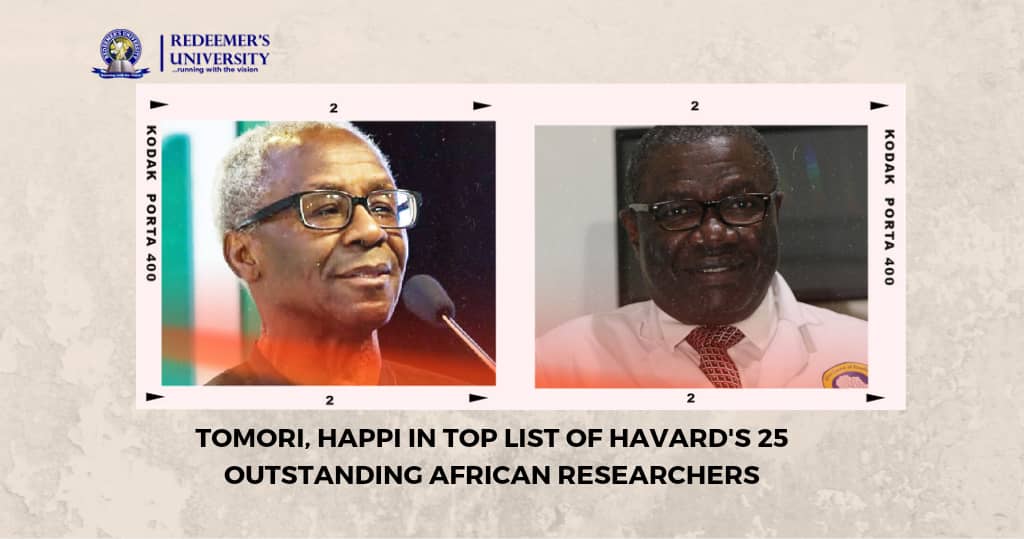Out of five notable Nigerians that have been elevated from the bench of research to the halls of government, two notable members of the Redeemer’s University (RUN) community have made the list of 25 outstanding voices in African Public Health according to the Harvard Public Health Magazine.
The two members of the institution are the pioneer Vice-Chancellor of the institution, Prof. Oyewale Tomori and the Director, Redeemer’s University African Centre of Excellence for Genomics of Infectious Diseases (ACEGID), Prof. Christian Happi.
According to the Harvard Public Health Magazine in a report titled ‘Standout voices in African public health’, these persons “are some of the notables making a new path for the field. They represent an increasingly deep bench of leaders shaping policy and practice on the continent.”
On Tomori, the Magazine noted: “Researching viruses. Established the African Regional Polio Laboratory Network, helping nearly eradicate poliovirus infections. Has studied Ebola, Lassa fever, Yellow fever, and Chikungunya, a virus that causes joints to swell. The Nigerian virologist, who also holds a DVM in veterinary medicine, isolated the properties of the Orungo arbovirus, which can cause encephalitis.”
Tomori led the development of the Africa Regional Polio Laboratory Network, a vital part of the global polio eradication programme. His work established a paradigm for the development of similar laboratory networks for measles, yellow fever, influenza and other viral haemorrhagic fevers, including Ebola virus, in Africa. Tomori is a virologist, former President and Fellow of the Nigerian Academy of Science (NAS) who had worked with the World Health Organisation (WHO).
On Christian Happi, the Magazine noted: “The professor of molecular biology and genomics at Nigeria’s Redeemer’s University leads a centre crucial for pathogen genomic surveillance in Africa. It serves as a reference laboratory for the WHO and Africa CDC. Produced the continent’s first genomic sequence for COVID-19. Also helps other African countries with sequencing, research, and more.” Happi is a Fellow of, the Nigeria Academy of Science (NAS) and the Director of, the African Centre of Excellence for Genomics of Infectious Diseases (ACEGID) at Redeemer’s University.
The other notable Nigerians on this exclusive list include, Prof. Muhammad Ali Pate, Dr. Akinwumi Adesina, and Temie Giwa-Tubosun.
On Adesina, Harvard Public Health Magazine noted: “As Minister of Agriculture and Rural Development, he leveraged mobile phones to increase access to improved seeds and fertilizers for 15 million farmers, boosting food production by 21 million metric tons. He rooted out corruption in Nigeria’s agriculture sector, prompting Forbes Africa magazine to name him its Person of the Year in 2013. He is currently in his second term as president of the African Development Bank Group.”
On Pate, it noted: “He galvanized efforts to reduce polio and drove innovation across the country’s health sector, including launching the Midwives’ Service Scheme to help reduce maternally and childhood mortality.” At the World Bank, Pate initiated a $100 million private-public partnership in Lesotho to build a new national referral hospital, completed in 2011. This was one of the first such development efforts in the health care sector in Africa. Co-chairs a Lancet commission aiming to improve global health systems and teaches at Harvard T.H. Chan School of Public Health.”
Pate is Co-Chair of the Core Panel of the Initiative on the Future of Health and Economic Resiliency in Africa (FHERA) and Professor of the Practice of Public Health Leadership at the Harvard T.H. Chan School of Public Health. Pate was a former Minister of State for Health and Executive Director, National Primary Health Care Development Agency (NPHCDA). On Giwa-Tubosun, the Magazine noted: “Supply chain logistics. Nigerian entrepreneur who founded LifeBank, a healthcare technology and logistics company that started with improving access to blood units for transfusion services in Nigeria and beyond. Has since expanded into medical oxygen access for patients. She works to develop and spread technologies that can be used to predict need for health commodities to create more efficient supply chains.

